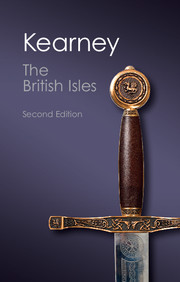Book contents
- Frontmatter
- Contents
- List of illustrations
- List of maps
- Preface to the first edition
- Preface to the second edition
- Map: the British Isles
- Introduction
- 1 The Celtic societies of the British Isles
- 2 The impact of Rome on the British Isles
- 3 The post-Roman centuries
- 4 The Vikings and the fall of the Old Order
- 5 The Norman and post-Norman ascendancy
- 6 The decline of the post-Norman empire
- 7 The making of an English empire
- 8 The remaking of an empire
- 9 The Britannic melting pot
- 10 The rise of ethnic politics
- 11 Between the wars
- 12 Withdrawal from empire
- 13 Post-imperial Britain: post-nationalist Ireland
- Afterword
- Selected reading list
- Index
- Frontmatter
- Contents
- List of illustrations
- List of maps
- Preface to the first edition
- Preface to the second edition
- Map: the British Isles
- Introduction
- 1 The Celtic societies of the British Isles
- 2 The impact of Rome on the British Isles
- 3 The post-Roman centuries
- 4 The Vikings and the fall of the Old Order
- 5 The Norman and post-Norman ascendancy
- 6 The decline of the post-Norman empire
- 7 The making of an English empire
- 8 The remaking of an empire
- 9 The Britannic melting pot
- 10 The rise of ethnic politics
- 11 Between the wars
- 12 Withdrawal from empire
- 13 Post-imperial Britain: post-nationalist Ireland
- Afterword
- Selected reading list
- Index
Summary
This is not a piece of national history, though it owes a great deal to the work of more nationally minded historians. It is an attempt to examine, within short compass, the interaction of the various major cultures of the British Isles from the Roman period onwards. The emphasis throughout is upon the British Isles, in the belief that it is only by adopting a ‘Britannic’ approach that historians can make sense of the particular segment in which they may be primarily interested, whether it be ‘England’, ‘Ireland’, ‘Scotland’, ‘Wales’, Cornwall or the Isle of Man.
To concentrate upon a single ‘national’ history, which is based upon the political arrangements of the present, is to run the risk of being imprisoned within a cage of partial assumptions which lead to the perpetuation of nationalist myths and ideologies. Herbert Butterfield, in his essay, The Whig Interpretation of History (London, 1931), stressed the importance of trying to see all sides of past conflicts. The modern world in his view arose from both Protestant and Catholic, not from one or the other. In the same way, no single ‘national’ interpretation, whether English, Irish, Scottish or Welsh, can be treated as self-contained. A ‘Britannic’ framework is an essential starting point for a fuller understanding of these so-called ‘national’ pasts.
This point might hardly seem worth stressing, were it not for the fact that, in its continued use of a ‘nation’ paradigm, the historiography of the British Isles still bears traces of its late nineteenth-century origins.
- Type
- Chapter
- Information
- The British IslesA History of Four Nations, pp. 1 - 12Publisher: Cambridge University PressPrint publication year: 2012
- 2
- Cited by



